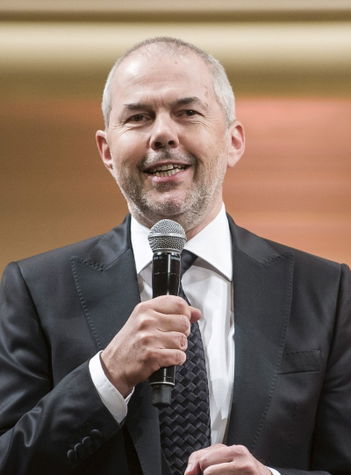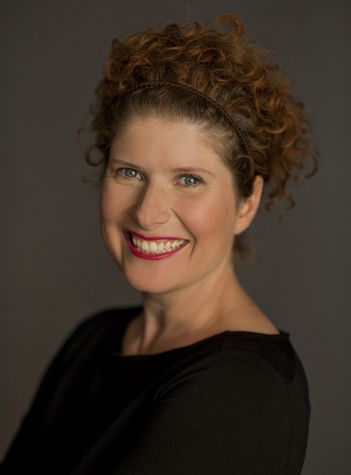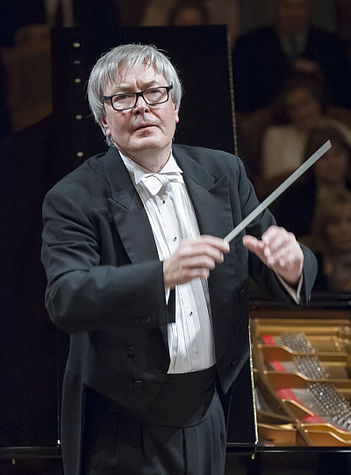Programme
Bedřich Smetana
Má vlast (My Country) – cycle of symphonic poems (Vyšehrad, Vltava, Šárka)
Smetana's "My Country" is not only the most frequently performed piece alongside Dvořák's "New World Symphony" for the Czech Philharmonic, but also an emblematic composition, which is part of a venerable interpretational tradition. What relationship do today's Philharmonic members have with Smetana's remarkable score – and with their parts? How does conductor Petr Altrichter view this unique cycle of symphonic poems?
Duration of the programme 2 hours
Bedřich Smetana
Má vlast (My Country) – cycle of symphonic poems (Vyšehrad, Vltava, Šárka)
Marek Eben host
Alice Nellis script and direction
Petr Altrichter conductor
Czech Philharmonic

The programme is based on a musical part but also on a spoken word that will be given in Czech language only. The programme will not be supplied with English subtitles.
Marek Eben host

Marek Eben is perhaps best known as a television moderator. He is the master of ceremonies for the popular Stardance competition, and since 1996 he has also been one of the prominent figures at the Karlovy Vary International Film Festival. However, as a graduate of the music drama department at the Prague Conservatoire, Eben is also a very active musician. Marek Eben is the son of Petr Eben, the late organist and composer, and he is carrying on father’s legacy in his own way as the exclusive author of songs for the band The Eben Brothers, which released its sixth album (Co my víme) at the beginning of the 2023/2024 school year. However, his work as a composer is not limited to his own band. He has written the music for the films Bizon and Hele on letí and for the television series Poste restante. He has also written music and texts for about 20 productions of plays including Othello at Studio Ypsilon and A Winter’s Tale at the National Theatre. On Czech Television, besides Stardance, he played a memorable part in the quiz show The Treasure of Agnes of Bohemia, and his talk show Na plovárně has become very popular. Marek Eben was twice the overall winner of the TýTý Prize, formerly awarded to the most popular television celebrities.
Alice Nellis stage director

Alice studied at the Prague Conservatory and later graduated from the Faculty of Arts of the Charles University with a major in English and American Studies and the Film Faculty of the Academy of Performing Arts in Prague. She has worked as a translator and has been teaching at the Film Faculty since 2002. In 2000, she directed her debut film Ene Bene starring Iva Janžurová and Theodora Remundová. The film won many international awards (including the main prize at the San Francisco International Film Festival). Her collaboration with Iva Janžurová and her daughters – actresses Theodora and Sabina Remundová – continued with the film Some Secrets (2002), for which Alice received the Best New Director Award at the 50th San Sebastian International Festival. The film also won her the Czech Lion Award for the best screenplay in 2002. Her other feature films include Little Girl Blue (2007), Manas and Papas (2010), Perfect Days (2011), Revival (2013), Angels (2014) and The Seven Ravens (2015). She also wrote the script for all her films. As an actress, she has appeared in The City of the Sun.
Besides the silver screen, Alice works in various theatres. She collaborates with Prague stages Divadlo Na zábradlí (Perfect Days, Floods), Divadlo Bez zábradlí (Love, When She Danced, Long Day’s Journey into Night), Café Theatre Černá labuť (The Human Voice, Pink Champagne) or Divadlo v Řeznické (Help). For her own play Floods performed in Divadlo Na zábradlí she won the 3rd prize in the Alfréd Radok Awards competition.
Petr Altrichter conductor

Petr Altrichter is one of the most distinguished Czech conductors, and he has earned an illustrious reputation for the dynamism and depth of his interpretations of symphonic music. He was raised in a musical family and played musical instruments from a young age. Having graduated from the Conservatory in Ostrava as a French horn player and conductor, he continued his studies at the Janáček Academy of the Performing Arts in Brno in orchestral conducting under Otakar Trhlík and František Jílek and choral conducting with Josef Veselka and Lubomír Mátl. After completing his studies in Brno, he worked as a choirmaster and conductor with the Brno Academic Choir, and contributed to the winning of many prizes at foreign choral competitions and festivals (Middlesbrough, Debrecen…).
Altrichter attracted international attention in 1976, when he won second prize and a special prize of the jury at the renowned International Conducting Competition in Besançon, France. Based on this achievement he began to work with the Czech Philharmonic Orchestra as an assistant of Václav Neumann, which started his artistic career. Not long after that, he began to receive invitations to conduct orchestras abroad. After working with the Brno Philharmonic Orchestra, in 1988 he became the principal guest conductor of the Prague Symphony Orchestra and in 1991 he was appointed its chief conductor. With that orchestra, he made frequent foreign tours to Japan, the USA, Switzerland, Germany, France, and other countries. At the same time he also closely collaborated with the Chamber Philharmonic Orchestra Pardubice, with which he often gave performances abroad introducing many gifted young soloists (such as Isabelle van Keulen and Radek Baborák).
From 1993 to 2004 he also worked as the Music Director of the Südwestdeutsche Philharmonie in Constance, Germany, with which he gave concerts regularly at the Tonhalle in Zurich and at the KKL in Lucerne, and also toured Switzerland and Italy. Having made his U.K. debut with the Prague Symphony Orchestra at the Edinburgh Festival in 1990, Petr Altrichter made his London debut with the English Chamber Orchestra 1993. He then conducted the Royal Liverpool Philharmonic Orchestra in 1994 to a great critical acclaim. He was subsequently appointed its Principal Conductor, a post he held from 1997 until 2001. With this orchestra he appeared at the 2000 BBC Proms at the Royal Albert Hall and made several highly-praised recordings on the orchestra’s own label, RLPO live.
In 2001 Altrichter was invited to become the Chief Conductor of the Brno Philharmonic Orchestra, and he remained there for seven years, returning to the orchestra with which he had been associated since his student days and which he continues to guest conduct up to this day. He is also a regular guest of the Czech Philharmonic Orchestra, with which he has maintained a steady artistic relationship since his beginnings there as an assistant conductor, and of the Prague Symphony Orchestra, the Brno Philharmonic Orchestra, and the Slovak Philharmonic Orchestra, with which he recorded an award-winning CD with Antonín Dvořák’s music. Since the 2018/2019 season, he has been a permanent guest conductor of the Slovak Philharmonic Orchestra, with whom he has been working for many years.
In 2015 he toured Germany with the Czech Philharmonic Orchestra, and in late 2015 and early 2016, he toured China with the same orchestra. At the beginning of the 2017/2018 season, he conducted the Czech Philharmonic at the Dvořák Prague International Festival and later toured very successfully in South Korea, Japan and Taiwan with the same orchestra. In the spring of 2017 he toured Japan with the Prague Symphony Orchestra. In 2018 he toured the United Kingdom with the Czech National Symphony Orchestra. In May 2019 he will be touring with the Czech Philharmonic in China.
Altrichter has appeared as a guest conductor with many leading international orchestras, including Japan’s NHK Symphony Orchestra and the Berlin Symphony Orchestra. In the United Kingdom he has collaborated with the BBC Symphony Orchestra, the Royal Scottish National Orchestra, the BBC Scottish Symphony Orchestra, and the London Philharmonic Orchestra. The orchestras he has guest conducted also include the Bruckner Orchestra in Linz, the Warsaw Philharmonic Orchestra, the Krakow Philharmonic Orchestra, the Southwest German Radio Symphony Orchestra in Baden-Baden, the Latvian National Symphony Orchestra in Riga, the Gran Canaria Philharmonic Orchestra, the Luxembourg Philharmonic Orchestra, the Netherlands Philharmonic Orchestra, the Stavanger Symphony Orchestra, the Norrköping Symphony Orchestra, the Royal Danish Orchestra in Copenhagen and the Odense Symphony Orchestra.
He is a frequent guest at festivals such as Prague Spring, Janáček May in Ostrava, Smetana’s Litomyšl, Moravian Autumn in Brno, and the Bratislava Music Festival. He has made guest appearances at major festivals in Salzburg, Edinburgh, Avignon, Athens, Cheltenham, Paris, Madrid, Chicago, Zurich, Lucerne, Seville, Palermo, and elsewhere.
The bulk of Petr Altrichter’s repertoire consists of Czech music (Bedřich Smetana, Antonín Dvořák, Leoš Janáček, and Bohuslav Martinů), Russian music (especially Dmitri Shostakovich), and the works of Gustav Mahler and Anton Bruckner. Outstanding soloists and performers from around the world (Garrick Ohlsson, John Lill, Tabea Zimmermann and others) value his flexibility in leading orchestral accompaniments, and they seek out collaboration with him.
Bedřich Smetana
Má vlast
By the time that Smetana was in Sweden in the 1850s, he had begun to take interest in a recent musical discovery known as the symphonic poem, invented by Smetana’s mentor, the composer Franz Liszt. The symphonic poem was intended as an emphatic response to all the criticism aimed at music as an artform: according to many aestheticians, the great weakness of music was its abstractness. For this reason, composers began writing works with a concrete extramusical programme such as, for example, a story, event, or description of nature. While working in Sweden from 1856 to 1861, Smetana wrote three symphonic poems: Richard III, Hakon Jarl, and Wallenstein’s Camp. Then in he wrote respectfully to Liszt: “Consider me to be the most fervent supporter of our artistic movement, who stands for its holy truth by word and deed.”
It was not until he was back in Bohemia over a decade later that her returned to thinking about more symphonic poems. He created the extraordinary musical cycle Má vlast (My Country), a unique concept in all of music history worldwide, from 1874 to 1879. By that time, he was totally deaf. He used music to portray the myths and history of Bohemia, the country where he lived, and also his vision of the “resurrection of the Czech nation”, which was then one of the nations of the Austro-Hungarian Empire. For this very reason, Smetana’s Má vlast enjoys a unique standing in the Czech musical tradition.
The creation of any more symphonic poems by Smetana is not mentioned until 1872. In November, the music journal Hudební listy reported that Bedřich Smetana “having fully completed his great patriotic opera Libuše (…) is now moving on to larger-scale orchestral compositions titled Vyšehrad and The Moldau.” By all accounts, Smetana did not plan the whole cycle in advance; instead, it took shape over several years. In 1873, the journal Dalibor published a somewhat fanciful article, claiming that Smetana was composing “a whole cycle of symphonic poems with the overall title The Homeland and with individual sections titled Říp – Vyšehrad – The Moldau – Lipany – White Mountain etc.”, but the story was not all that far from the truth when it claimed that the composer was creating a work “based on our country’s most important moments of glory and misfortune.”
As “programme music”, Má vlast has meaning that goes beyond the world of notes, chords, or melodic lines; it involves people, things, places, and stories of the past and present. Smetana succeeded at capturing what one might call the “Czech soul” in a remarkably comprehensive way, and in Má vlast he created an amazingly timeless composition. All the political slogans of the latter half of the 19th century, when the work was written, have since inevitably become outdated (as do all political slogans ultimately), but Smetana’s music still finds a way to reach, awaken, and inspire listeners.
Smetana’s Má vlast is associated with the history of the Czech Philharmonic like few other works. It is part of a great performance tradition that dates back to 1901, when the orchestra first performed the whole cycle of symphonic poems. Since then, the Czech Philharmonic has played the work over 700 times! No other orchestra in the world has played Má vlast so often. It has given performances on workdays, weekends, and holidays, and there have even been a number of commemorative performances when Smetana’s music had a very special resonance.
1924 saw the commemoration of the 100th anniversary of Smetana’s birth, and for the occasion Václav Talich prepared a performance of Má vlast with the combined orchestras of the Czech Philharmonic and the Prague Conservatoire. Má vlast was also the first work recorded by the Czech Philharmonic with Talich on the His Master’s Voice label. Smetana’s cycle became symbolically important during the Nazi occupation and the Second World War. An incredible recording was made of Talich’s Má vlast performance in June 1939, and hearing it still sends a chill up one’s spine. They play as if their lives depended on it, and at the end, the audience sang the Czech national anthem Kde domov můj (Where My Home Is). At such times, music ceases to be a kind of cultural experience that we come to enjoy, but instead sears its way into our innermost being.
For Czech listeners, in difficult times Má vlast sounds urgent like a call to arms, but there are also moments of liberation when Smetana’s special music affirms that “the governance of your own affairs will return to you, O ye Czech people”. That is how it was in June 1945, when the Czech Philharmonic played Smetana’s cycle on Old Town Square to express thanks for the end of the war. That is how it was in May 1968, when Karel Ančerl and the orchestra opened the Prague Spring Music Festival in an atmosphere of great societal revival and liberalisation after 20 years of totalitarianism. And that was again the case in the spring of 1990, shortly after the communist regime had definitively fallen. After 42 long years of exile, the conductor Rafael Kubelík returned home. “I have fervently awaited this moment, and I believed that it would come one day. I am grateful to God, to the whole nation, to my friends, and to all of you.” Those were Kubelík’s first words upon returning to his homeland on 8 April 1990. “What Václav Havel has been able to achieve recently is not a miracle, but rather proof that there are no miracles and that in mankind there is strength that can truly move mountains.”
For nearly the entire 20th century, Smetana’s cycle was something like the exclusive property of the Czech Philharmonic and other Czech orchestras. Today those orchestras face competition over which one can only rejoice. Má vlast is a valued item in the repertoire of the Berlin Philharmonic, the Vienna Philharmonic, and the orchestras in Munich, Bamberg, Cologne, Hamburg, Madrid, Amsterdam, and Cleveland. It was heard recently at the Prague Spring Festival and at the 2022 Salzburg Festival played by Barenboim’s West-Eastern Divan Orchestra consisting of young musicians from the Middle East. Má vlast has become an international work.